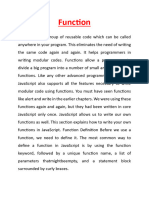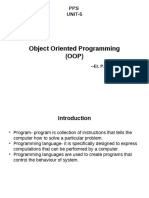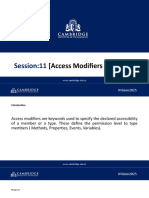RCPP Extending
Uploaded by
David MoroRCPP Extending
Uploaded by
David MoroRcpp Extending
Dirk Eddelbuettela and Romain Françoisb
a
http://dirk.eddelbuettel.com; b https://romain.rbind.io/
This version was compiled on September 24, 2017
This note provides an overview of the steps programmers should follow to # [1] 10
extend Rcpp (Eddelbuettel et al., 2017a; Eddelbuettel and François, 2011)
for use with their own classes. This document is based on our expe- The Rcpp converter function Rcpp::as and Rcpp::wrap have
rience in extending Rcpp to work with the Armadillo (Sanderson, 2010) been designed to be extensible to user-defined types and third-party
classes, available in the separate package RcppArmadillo (Eddelbuettel types.
et al., 2017b). This document assumes knowledge of Rcpp as well as
some knowledge of C++ templates (Abrahams and Gurtovoy, 2004). 2. Extending Rcpp::wrap
Rcpp | extending | R | C++ The Rcpp::wrap converter is extensible in essentially two ways :
intrusive and non-intrusive.
1. Introduction 2.1. Intrusive extension. When extending Rcpp with your own
Rcpp facilitates data interchange between R and C++ through the data type, the recommended way is to implement a conversion to
templated functions Rcpp::as (for conversion of objects from R SEXP. This lets Rcpp::wrap know about the new data type. The
to C++) and Rcpp::wrap (for conversion from C++ to R). In other template meta programming (or TMP) dispatch is able to recognize
words, we convert between the so-called S-expression pointers (in that a type is convertible to a SEXP and Rcpp::wrap will use that
type SEXP) to a templated C++ type, and vice versa. The corre- conversion.
sponding function declarations are as follows: The caveat is that the type must be declared before the main
header file Rcpp.h is included.
// conversion from R to C++
template <typename T> T as(SEXP x); #include <RcppCommon.h>
// conversion from C++ to R class Foo {
template <typename T> SEXP wrap(const T& object); public:
Foo();
These converters are often used implicitly, as in the following
code chunk: // this operator enables implicit Rcpp::wrap
operator SEXP();
#include <Rcpp.h> }
using namespace Rcpp;
#include <Rcpp.h>
// [[Rcpp::export]]
List fx(List input) { // we get a list from R
This is called intrusive because the conversion to SEXP operator
// pull std::vector<double> from R list
has to be declared within the class.
// this is achieved through an implicit
// call to Rcpp::as 2.2. Non-intrusive extension. It is often desirable to offer auto-
std::vector<double> x = input["x"]; matic conversion to third-party types, over which the developer
has no control and can therefore not include a conversion to SEXP
// return an R list; this is achieved operator in the class definition.
// through an implicit call to Rcpp::wrap To provide automatic conversion from C++ to R, one must de-
return List::create(_["front"] = x.front(), clare a specialization of the Rcpp::wrap template between the
_["back"] = x.back()); includes of RcppCommon.h and Rcpp.h.
}
#include <RcppCommon.h>
Example:
// third party library that declares class Bar
## Run sourceCpp compilation to include file
#include <foobar.h>
# Rcpp::sourceCpp(file= "code.cpp")
input <- list( x = seq(1, 10, by = 0.5) )
// declaring the specialization
fx(input)
namespace Rcpp {
template <> SEXP wrap(const Bar&);
# $front }
# [1] 1
# // this must appear after the specialization,
# $back // otherwise the specialization will not be
https://cran.r-project.org/package=Rcpp Rcpp Vignette | September 24, 2017 | 1–3
// seen by Rcpp types #include <Rcpp.h>
#include <Rcpp.h>
It should be noted that only the declaration is required. The 3.2. Non-intrusive extension. It is also possible to fully specialize
implementation can appear after the Rcpp.h file is included, and Rcpp::as to enable non-intrusive implicit conversion capabilities.
therefore take full advantage of the Rcpp type system. #include <RcppCommon.h>
Another non-intrusive option is to expose an external pointer.
The macro RCPP_EXPORT_WRAP provides an easy way to expose a // third party library that declares class Bar
C++ class to R as an external pointer. It can be used instead of
#include <foobar.h>
specializing Rcpp::wrap, and should not be used simultaneously.
#include RcppCommon.h // declaring the specialization
#include foobar.h namespace Rcpp {
template <> Bar as(SEXP);
RCPP_EXPORT_WRAP(Bar); }
// this must appear after the specialization, or
2.3. Templates and partial specialization. It is perfectly valid to
// specialization will not be seen by Rcpp types
declare a partial specialization for the Rcpp::wrap template. The
#include <Rcpp.h>
compiler will identify the appropriate overload:
#include <RcppCommon.h> Furthermore, another non-intrusive option is to opt for sharing
an R external pointer. The macro RCPP_EXPORT_AS provides an
// third party library that declares easy way to extend Rcpp::as to expose R external pointers to C++.
// a template class Bling<T> It can be used instead of specializing Rcpp::as, and should not be
#include <foobar.h> used simultaneously.
// declaring the partial specialization #include RcppCommon.h
namespace Rcpp { #include foobar.h
namespace traits {
RCPP_EXPORT_AS(Bar);
template <typename T>
SEXP wrap(const Bling<T>&); With this being said, there is one additional macro that
can be used to simultaneously define both Rcpp::wrap and
} Rcpp::as specialization for an external pointer. The macro
} RCPP_EXPOSED_CLASS can be use to transparently exchange a class
between R and C++ as an external pointer. Do not simultane-
// this must appear after the specialization, or ously use it alongside RCPP_EXPOSED_AS, RCPP_EXPOSED_WRAP,
// specialization will not be seen by Rcpp types Rcpp::wrap, or Rcpp::as.
#include <Rcpp.h>
3.3. Templates and partial specialization. The signature of
Rcpp::as does not allow partial specialization. When expos-
3. Extending Rcpp::as ing a templated class to Rcpp::as, the programmer must spe-
Conversion from R to C++ is also possible in both intrusive and cialize the Rcpp::traits::Exporter template class. The TMP dis-
non-intrusive ways. patch will recognize that a specialization of Exporter is avail-
able and delegate the conversion to this class. Rcpp defines the
3.1. Intrusive extension. As part of its template meta programming Rcpp::traits::Exporter template class as follows :
dispatch logic, Rcpp::as will attempt to use the constructor of the
namespace Rcpp {
target class taking a SEXP.
namespace traits {
#include <RcppCommon.h>
template <typename T> class Exporter{
class Foo{ public:
public: Exporter(SEXP x) : t(x){}
Foo(); inline T get() { return t; }
// this ctor enables implicit Rcpp::as private:
Foo(SEXP); T t;
} };
}
}
// this must appear after the specialization, or
// specialization will not be seen by Rcpp types This is the reason why the default behavior of Rcpp::as is to
invoke the constructor of the type T taking a SEXP.
2 | https://cran.r-project.org/package=Rcpp Eddelbuettel and François
Since partial specialization of class templates is allowed, we can Using this approach, the requirements for the Exporter<
expose a set of classes as follows: Bling<T> > class are:
#include <RcppCommon.h> • it should have a constructor taking a SEXP
• it should have a methods called get that returns an instance
// third party library that declares of the Bling<T> type.
// a template class Bling<T>
#include <foobar.h>
4. Summary
// declaring the partial specialization The Rcpp package greatly facilitates the transfer of objects between
namespace Rcpp { R and C++. This note has shown how to extend Rcpp to either user-
namespace traits { defined or third-party classes via the Rcpp::as and Rcpp::wrap
template <typename T> template functions. Both intrusive and non-intrusive approaches
class Exporter< Bling<T> >; were discussed.
}
}
// this must appear after the specialization, or
// specialization will not be seen by Rcpp types
#include <Rcpp.h>
References 0.12.12, URL http://CRAN.R-Project.org/package=Rcpp.
Eddelbuettel D, François R, Bates D, Ni B (2017b). RcppArmadillo: Rcpp
Abrahams D, Gurtovoy A (2004). C++ Template Metaprogramming: Concepts,
integration for Armadillo templated linear algebra library. R package version
Tools and Techniques from Boost and Beyond. Addison-Wesley, Boston.
0.7.960.1.2, URL http://CRAN.R-Project.org/package=RcppArmadillo.
Eddelbuettel D, François R (2011). “Rcpp: Seamless R and C++ Integration.”
Sanderson C (2010). “Armadillo: An open source C++ Algebra Library for Fast
Journal of Statistical Software, 40(8), 1–18. URL http://www.jstatsoft.org/v40/
Prototyping and Computationally Intensive Experiments.” Technical report,
i08/.
NICTA. URL http://arma.sf.net.
Eddelbuettel D, François R, Allaire J, Ushey K, Kou Q, Russel N, Chambers J,
Bates D (2017a). Rcpp: Seamless R and C++ Integration. R package version
Eddelbuettel and François Rcpp Vignette | September 24, 2017 | 3
You might also like
- Extending RCPP: Dirk Eddelbuettel Romain FrançoisNo ratings yetExtending RCPP: Dirk Eddelbuettel Romain François6 pages
- Writing A Package That Uses RCPP: Dirk Eddelbuettel and Romain FrançoisNo ratings yetWriting A Package That Uses RCPP: Dirk Eddelbuettel and Romain François4 pages
- RCPP Attributes: J.J. Allaire Dirk Eddelbuettel Romain FrançoisNo ratings yetRCPP Attributes: J.J. Allaire Dirk Eddelbuettel Romain François15 pages
- Writing - A - Simple - Publisher - and - Subscriber in C++No ratings yetWriting - A - Simple - Publisher - and - Subscriber in C++5 pages
- RCPP Attributes: J.J. Allaire, Dirk Eddelbuettel, and Romain FrançoisNo ratings yetRCPP Attributes: J.J. Allaire, Dirk Eddelbuettel, and Romain François6 pages
- Rcaller: A Library For Calling R From Java: by M.Hakan Satman August 17, 2013No ratings yetRcaller: A Library For Calling R From Java: by M.Hakan Satman August 17, 20136 pages
- Getting Started: Openmp 5.2 Api Syntax Reference GuideNo ratings yetGetting Started: Openmp 5.2 Api Syntax Reference Guide16 pages
- Hygienic Macros Through Explicit RenamingNo ratings yetHygienic Macros Through Explicit Renaming4 pages
- Ranges For The Standard Library - Eric Niebler - CppCon 2015No ratings yetRanges For The Standard Library - Eric Niebler - CppCon 201564 pages
- Lesson Plan - Functions and scope of variablesNo ratings yetLesson Plan - Functions and scope of variables11 pages
- Adding Lambda Expressions To Forth: Angel Robert Lynas and Bill StoddartNo ratings yetAdding Lambda Expressions To Forth: Angel Robert Lynas and Bill Stoddart13 pages
- ROS Cheat Sheet: Filesystem Command-Line ToolsNo ratings yetROS Cheat Sheet: Filesystem Command-Line Tools2 pages
- Arc Hydro - Calling Arc Hydro Tools in PythonNo ratings yetArc Hydro - Calling Arc Hydro Tools in Python10 pages
- Lambda Expressions in Java 8: Reading MaterialNo ratings yetLambda Expressions in Java 8: Reading Material26 pages
- Understanding Software Engineering Vol 3: Programming Basic Software Functionalities.From EverandUnderstanding Software Engineering Vol 3: Programming Basic Software Functionalities.No ratings yet
- UNIX Shell Programming Interview Questions You'll Most Likely Be AskedFrom EverandUNIX Shell Programming Interview Questions You'll Most Likely Be AskedNo ratings yet
- Python Inheritance, Method Overriding, AbstractionNo ratings yetPython Inheritance, Method Overriding, Abstraction5 pages
- Object Oriented Programming (OOP) : PPS UNIT-5No ratings yetObject Oriented Programming (OOP) : PPS UNIT-548 pages
- Programming Techniques Sheet #7: Cairo University Faculty of Engineering CMP 103 & CMP N103No ratings yetProgramming Techniques Sheet #7: Cairo University Faculty of Engineering CMP 103 & CMP N1032 pages
- 9 - Object Oriented Programming Using PythonNo ratings yet9 - Object Oriented Programming Using Python27 pages
- Sample of Project Report For Class 11 Students75% (8)Sample of Project Report For Class 11 Students10 pages

























































































